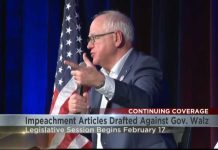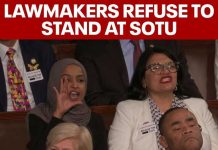
California’s governor just threatened to toss out his state’s independent redistricting to “neutralize” GOP gains—tying California’s maps to what Texas Republicans do at President Trump’s urging.
Story Highlights
- Newsom proposed a “trigger” remap to override California’s independent commission if GOP-led states continue redrawing maps.
- A letter offered Trump a truce: halt GOP remaps and California stands down; otherwise, Democrats push a counter-map.
- Civic and business groups in California warned Newsom not to abandon voter-first redistricting.
- A rapid timeline includes a potential November special election and a draft map promised the following week.
Newsom’s Conditional “Trigger” Redistricting Threat
California Gov. Gavin Newsom tied a potential statewide remap to actions in GOP-led states, saying California would override its independent process to offset Republican gains if Texas and others proceed with partisan redraws pressured by President Trump. He framed the approach as deterrence, asserting California could “neutralize” any GOP advantages. The plan would reverse California’s reform model by superseding the citizen-led commission in favor of a partisan-aligned map built to counter Texas changes.
Newsom formalized the offer in a Monday letter to Trump, proposing a stand-down if GOP redistricting stops. Absent a halt, he pledged emergency measures and a swift path to enact a counter-map. Axios reported he pushed a first-week-of-November special election to advance Democrats’ plan and promised to release a draft map the following week. The unusual “trigger” framework signals an escalation that links California’s maps to decisions made hundreds of miles away in Texas.
Texas Push, Inter-State Coordination, and GOP Response
Trump publicly urged Texas Republicans to secure additional congressional seats, while Texas legislators advanced a new map. Texas Democratic lawmakers fled the state to block a quorum and then appeared with Newsom in Sacramento, spotlighting interstate coordination. Trump’s spokesperson Steven Cheung dismissed Newsom’s aims as political ambition, sharpening partisan lines. The FBI’s coordination with local law enforcement regarding the missing Texas Democrats underscored how heated the standoff became as deadlines and political stakes loomed.
Control of the House in 2026 could hinge on marginal seat shifts, raising the stakes for both parties. Newsom said California would not “sit by idly,” vowing to “fight fire with fire” to nullify Republican gains. National Democrats cast the tactic as symmetric deterrence, while Republicans view it as an admission that Democrats will junk their own reform rules when power is at risk. The result is a test of whether California’s lauded independent model withstands partisan pressure when national control hangs in the balance.
Backlash From Reformers and Legal-Process Questions
A broad California civic-business coalition—including Common Cause California, the League of Women Voters of California, the California Farm Bureau, and others—urged Newsom to preserve the independent commission and avoid politicizing the process. Reform advocates warned the plan contradicts “voters, not politicians” principles that California spent years building. Experts flagged unresolved legal mechanics for overriding the commission, with indications that Newsom might pursue a voter-approved mechanism via special election subject to litigation and intense scrutiny.
Bloomberg Government characterized Newsom’s letter as a truce offer and an atypical tit-for-tat move that could destabilize national redistricting norms while asserting California’s power to cancel out GOP gains. Axios detailed procedural elements of the proposed special election and the promised next-week draft map, while the Los Angeles Times highlighted the optics of hosting Texas Democrats and the pledge to “nullify what happens in Texas.” Together, the reports show alignment on core facts but underscore significant risks to institutional credibility.
Short term, voters could face confusion and lawsuits if California suspends its independent system; nationally, partisan mobilization will intensify. Long term, abandoning a commission could invite reciprocal gerrymanders elsewhere, entrenching a spiral that is hard to unwind—even if a truce later emerges. For constitutional conservatives, the concern is clear: a major state signaling it will discard voter-approved guardrails to achieve a partisan balance threatens equal representation, trust in institutions, and consistent rule-of-law standards.
Sources:
Gerrymandering in California and a Fight Democrats Can Only Lose
Newsom urges Trump to halt GOP redistricting
Newsom Urges Trump to Halt GOP Redistricting
Newsom vows to ‘fight fire with fire’ over Texas GOP’s redistricting push
‘You Are Playing With Fire’: Newsom Urges Trump to Abandon Partisan Redistricting Fight
















